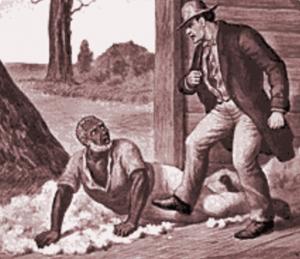This the second post of a two-part response to Michael’s excellent Memorial Day post. My main problem with nationalism is that it violates the “Catholic principle”, the idea that we should not set limits and definitions on our definition of “neighbor”. In other words, borders might be necessary for purely administrative reasons, but should never become imbued with mystical qualities of their own. Too often today, there is the tendency in America to glorify the nation state and all the surrounding paraphernalia (flag etc.) without due regard for the all-embracing nature of Christianity. Indeed, the deep and passionate attachment to nationalism often borders on idolatry, and is indeed, a secular civic religion.
The relationship between the Church and the secular arm has been a troubled one since the time of Constantine. Sometimes it acquitted itself well, sometimes it did not. For a long time, the Church could at least hold its own against the latest in a long line of avaricious secular rulers. But the Church ultimately lost this war, as the secular authorities appropriated more and more Church prerogatives, including the appointment of bishops. Indeed, the issue of lay investiture lasted until the 20th century. During the conclave that produced Pope Pius X in 1903, Cardinal Rampolla received the majority of votes, but was vetoed by the Austro-Hungarian empire. This is not so long ago! And remember the humiliation of two popes at the hands of Napoleon…
The rise of nationalism is key to understanding the increasing subjugation of the Church, whose universal concerns were increasingly scorned and derided. Funnily enough, the birth of nationalism was midwifed by the reformation, which fostered the fusing of secular and religious authority.
We should remember that nationalism and the rise of the nation state is a relatively modern phenomenon. Before the Enlightenment, nationalism, at least as understood today, was non-existent. The ruler was regarded as having a divine mandate to rule, but this was contingent upon the ruler supporting the common good. There was never any obligation to support tyrants. Of course, the environment was very different, during a time when borders were in constant flux, and when there was no real concept of a “state” demanding allegiance. Loyalties were of a local nature. But the rise of nationalism changed the equation, as (absent any notion of the divine), the state itself became an end in itself. It is by no accident that many trace the birth of modern nationalism to the French Revolution, the ultimate in fake “civil religions”. As Christianity waned, secular mythologies and ideologies arose take its place, and those ideologies often glorified country. In its extreme forms, this ideology quickly shifted into the venomous pseudo-religions that so marked the 20th century. Even its more benign forms (such as in the United States) it is, in its essence, an artificial concept prone to corruption.
As nationalism waxed, so did the Church’s opposition. The Church also recognized the dangers in unleashing an ideology that placed allegiance to some group– nation, race, class– above our common humanity. But today, past battles of church and state seem distant memories. No latter-day Napoleon plans on kidnapping and man-handling the pope. And the Church has long made its peace with the forces of “liberalism” and “modernism” and reached an accommodation with the modern world, and justifiably so, but this is still a world where nationalism holds sway.
Has the church become too docile in the face of nationalism? For those who claim that many died for their country, I would counter-claim that many, many Christians also died (often horribly) in opposition to the Roman civic religion. Has the accommodation with the modern civic religion gone too far? Perhaps. So, yes, the Church should not take sides in wars and other nationalistic squabbles. It should remain above the fold and stay true to its universal teachings. It should not refer to one side as “ours”. There should be no flags or secular symbols in churches. On matters of war and peace, it should follow the example of Benedict XV with his scrupulous neutrality, always calling for peace. In particular, American bishops and priests should not shy away from following the Vatican line on important matters of state, regardless of the position of the particular regime in office.
We should always remember the wonderful words of St. Thomas More: “I am the King’s good servant, but God’s first”. After he uttered these words, More was executed, and is now a saint of the Church. He stood against the forces of secular nationalism. He stood for truth, for universal truth. Would that others had his courage today, especially since the only downside is mild scorn, not loss of life. A little courage goes a long way.












